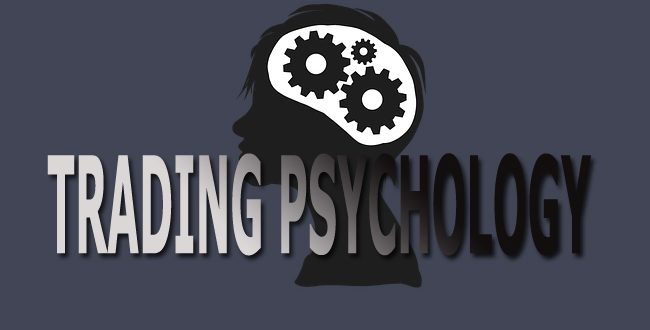TRADING PSYCHOLOGY AND RISK MANAGEMENT
There square measure only a few laws for commerce, however, this can be one in every one of them: Improper risk
management ends up in emotional commerce issues. Win or lose, if you risk
too much on a trade, you may endure emotional issues. it’s not solely with
the losing trades that improper risk management rears its head. Improper
risk management—risking an excessive amount of on a trade—leads to emotional problems,
even if the trade is fortunate. If an excessive amount of risk is placed in a very trade and it
ends up a winner, certitude, irrational exuberance, and sloppy trade
execution could also be the result. If an excessive amount of risk is placed in a very trade that ends
up being a loser, any range of results could occur: commerce rules could also be unnoticed, psychological
despair could result, and also the management of the trade
will nearly always be exceptionally poor. there’s no means around this law
of trading
Emotional Trading!
Emotional issues are always related to your confidence in trading, the current trade-in play, or your confidence in the trading system.
Emotional issues will creep into your trading regardless of whether you like it. You think
that you keep your emotions out of your trading, but, for most traders, this
is not true. Most traders get extremely upset after a losing streak, or a losing trade,
or missing out on a great trade opportunity. Under most circumstances, traders have a very difficult time removing emotion from trading
decisions.
However, is it important to remove all emotions from your trading? Is
it a bad idea to trade unemotionally? After all, if it is impossible to remove
emotions from trading, perhaps you should embrace your emotions. The
standard opinion about emotional trading today, most gurus tell us, is that
emotional trading is destructive. This is not true. The only destructive trading is trading that
is not according to your rules. So whether it is emotional
trading or logical trading, if you trade in a manner that is not consistent
with you rules, you are trading in a destructive matter.
Emotional trading is the result of improper risk management. When
the risk becomes too much, rational reaction to the market is impossible.
If you have ever had a trade in which you took a large position—too large
a position—and the trade went against you, you know what it is like to try
and think when your emotions are running wild.
The antidote to this is to apply proper risk management to your trades,
use a well-rehearsed set of trading rules, and apply these over and over
again in your trading
Worst-Case Planning!
Worst-case planning means planning for the maximum loss on each trade.
This way, the maximum loss cannot hurt you. Over time, by planning for
the same loss (your maximum loss, where your stop loss is placed), you
will become more efficient in executing your trades. This is the magic of
consistent risk management. If each trade has the same risk associated
with it, over time you will build up valuable experience with this risk level.
If you keep your risk the same, the worst-case scenario for each and
every trade is the same. If you walk outside barefoot on a hot day on the
asphalt, your feet may burn. However, if you walk outside every day when
it’s hot, the asphalt slowly becomes bearable. The same principle applies
to drug addicts; over time, drug addicts must take more and more of the
same drug to get the same high. This principle of tolerance also applies
to traders. It’s the tendency for trading execution to become more precise
over time when the same amount of money is at risk on every trade. By
risking the same percentage of your trading account on every trade, you
will become used to the amount of money at risk. You will become immune,
over time, to the equity swings in your account with each losing trade, or
each winning trade. What will happen, over time, is that you will begin
to focus on what is important—executing your trades, and you will not
concentrate on the money gained or lost on each trade.
Encourage Trading Tolerance!
This is how you may encourage trading tolerance. First, calculate your
worst-case scenario. This should be the dollar loss if your stop-loss is hit.
Second, add 20 percent to this amount. Third, use this figure when calculating the risk for your trades.
You should assume this (percentage) risk for
all of your trades. Finally, use this formula to calculate your risk for each
trade. Before long, you will become accustomed to risking this amount. Be
prepared to lose this amount. Be prepared for these losing trades, and be
prepared for a sequence of losing trades.
Before long, the amount of money will not seem significant, and you
will begin to focus on trade execution. This is where the money is to be
made.
RISKY MONEY TRAPS!
Why do most traders fail? Why is trading for consistent profits so difficult?
Traders are simply people who look to buy something when it is cheap
and look to sell something when it is expensive. Traders get paid to be
bargain hunters and agile market participants. However, there are so many
people in the markets who find extreme difficulty attempting to extract
profits from the markets.
A close look at the reasons that traders fail—the risky money
traps—and how to overcome each of these traps will prepare you for entry into the markets.
Remember to consider the other market participants.
Many of these people are well capitalized, and they have intelligent people
behind the construction and execution of their trading strategies. If you
find it difficult to overcome your own issues, if you fall into one of the risky
money traps before you have entered the markets, you are at a significant
disadvantage.
Your Account Is Unprotected!
The number-one trading skill you need to succeed as a trader is the ability
to protect your trading account. This is paramount to all other goals, protecting your account means survival.
Traders who are unable to make the
jump from a novice trader to a professional trader fail to recognize the importance of playing defense.
Professional traders are very good at playing defense. Watch the “Tale of Three Trades” video at
a real market example of how this concept may be applied to live trades. If
you can get into the habit of playing defense, you can become a successful
professional trader. Learn to recognize the importance of playing defense.
Without this, you have no chance.
Traders who are unable to protect their money have difficulties with
beliefs. These traders may believe they are unworthy of large amounts of
money. They may also confuse their belief with the facts. Beliefs may become facts,
but traders deal with odds when it matters most.
I may believe the USD/CAD is headed down because the market prints
a bearish kangaroo tail on the daily chart. I may decide to risk money based
on my belief that the USD/CAD will start trading lower soon. However, this
does not make my belief in fact. I must wait for the market to tell me whether
my belief is going to become a market fact.
If the market instead begins to trade higher and higher and higher,
I come to a crossroads. Perhaps I decide on one of the following three
courses of action:
(1) I may decide to dump the trade because my belief
seems to be incorrect.
(2) I may decide to move my stop loss higher, to
give the trade a little more breathing room because I know the market will
eventually, fall.
(3) I may even decide to walk away from my computer, to
let the market decide whether my belief is correct, knowing that either my
stop-loss or my profit target will be hit. Two of these reactions (1 and 3)
are acceptable means of dealing with my belief, based on the current market activity.
The other reaction, 2, is detrimental to my trading account. I
have decided to rewrite my trading plan (initial stop loss moved, the trade
now has more risk than originally planned for), and I have decided that my
belief is a market fact, even when the market provides information to the
contrary.
Think about that. The market has told me that a fair price is higher, not
lower. I think the market is headed lower. This is my belief based on the
daily bearish kangaroo tail. However, the market trades higher. I ignore the
market information, the market freely provides me with information about
the USD/CAD (the fair market price is higher), and I decide to assume the
opposite in fact. The market goes up and I decide the market is wrong.
Who do you think will win this battle of wits? Will I win or will the
market win?
Remember to keep your beliefs in perspective. There are no beliefs
worth more than your entire trading account. You work hard for your
money, so defend it. Throw away your beliefs when the market tells you
they are incorrect. Keep your money instead.
There are many other beliefs that stand in the way of trading success.
Perhaps you are familiar with these risky ideas, such as the I-will-make-it big-once-I-get-a-big-account idea.
You Need More Screen Time!
At times it may seem as though you do not have the time to trade. Among
the daily commitments of work, family, and hobbies, it can be difficult to
find time to trade. Those missed opportunities can be awful. Simply watching the market march on without you can be more difficult to deal with
than the standard-issue losing trade.
Maybe more time in front of the computer will mean more profits?
Maybe you think that trading shorter-time-frame charts might multiply your
trading opportunities and accelerate your equity curve? Perhaps this is
true; if you are able to trade the shorter time-frames you may find more
opportunities, if you are able to schedule more screen time, more time in
front of your charts.
Please beware that “I need more screen time to trade” is not an excuse for avoiding back-testing. All of your systems should be vetted with
back-testing results, forward-testing results, and the smaller live-trading
account.
Most traders will use this excuse to create a case for leaving a job,
and this thinking is a dangerous place to be. Many traders are not quite
ready to start trading full-time, but they think that by leaving their full-time
permanent jobs, the added screen time will push them over the top and
make it easier for them to achieve trading success. Sadly, this is often not
true
Your Job Is Holding You Back!
Related to the I-need-more-screen-time trap is the I-gotta-dump-my-job
trap. Traders fantasize that more time, specifically more screen time will
help them to achieve consistent profits. A little more focus will bring the
results they are looking for in their trading.
This seems logical, but it rarely works. Putting yourself in a situation in
which you need to make money consistently from your trading account before you have
learned how to consistently make money from your trading,
is a bad idea. You would not expect a stuttering game show contestant to be
able to rattle off quiz answers with the pressure of the clock ticking down,
would you? This is why it makes sense for you to take the proper steps,
starting with backtesting, moving to forward testing, then on to small account trading,
before you ever begin trading for a living, trading your large
trading account.
Unrealistic expectations may also affect your trading. It may be tempting to backward engineer
your trading profits. Perhaps you decide to trade
the daily charts, and you would like to make $15,000 per month from your
trading. You decide that you need to make 500 pips each month and trade
for $30 per pip. $30 per pip × 500 pips = $15,000; simple math provides you
with your trading goal.
What if your trading account contains only $35,000? You may have
to be very careful. If you are trading at $30 per pip and your stop-loss is
100 pips away from your entry price (certainly possible with a daily chart
trade), you are risking $3,000 on your trade, which is 8.5 percent of your trading account at risk.
Three losing trades such as this one and you would be
down over 30 percent on your trading account. This is why many traders
have a difficult time making the jump from part-time to full-time trader,
your nice-to-have-profits turn into must-have profits; the focus is on the
money and not the trading results.
Thinking about trading in terms of money is precisely why many part-time traders want to leave their full-time jobs.
It is also the reason many
part-time traders find consistently profitable trading so elusive once they
leave their jobs. Remember to concentrate on your trading, execute each
trade as best you can. The money will come if you concentrate on becoming
a better trader.
You Need a Bigger Account!
Some traders insist on holding to the idea that only larger trading accounts
will allow for success. The idea is that the giant trading account in the sky
will bring some sort of nirvana. Unfortunately, for many of the reasons
listed earlier in this chapter (namely, attitudes toward money and wealthy
people), the opposite is actually true.
The great majority of traders around the world do much better trading
when placing trades in very small accounts. Once traders move up to larger
accounts, in most circumstances these traders end up thinking too much
about the money and too little about managing trades according to their
system rules.
It is possible to do exceptionally well, even if you start off with a very
small trading account. The focus should be on trading your system. Your
effort should be placed on executing and managing your trades as closely
as possible to the rules of your system. If you move away from trading your
system and instead focus on the dollar amounts, you will likely see your
performance suffer. If you have issues with money and wealthy people,
you are sure to see your performance suffer.
The idea that a large trading account will help you achieve your financial goals may be comforting,
but until you have been able to successfully
manage your smaller trading account, and until you deal with your beliefs
about wealthy people and money, trading a large trading account will probably be a little more than frustrating.
Large is, of course, a relative word. For some traders a large account
would be an account of $10,000 and for other traders an account size of
$150,000 is small. Think about this: the idea that a few traders may see an
account and think that it is very small and other traders may see the same
account and think that it is a very large account. The fact that traders can
view the same account very differently is more evidence for the idea that
traders’ attitudes and beliefs toward money will drastically affect how well
traders make money and sound trading decisions.
So if you find yourself thinking, “I need a bigger trading account so I
will really be able to make some serious money,” make sure that you are
making serious money with your smaller accounts first. A larger account
may simply make trading more difficult if you are not prepared for the
challenge.
Thinking That Trading Is Easy!
Maybe you think that that systematically profitable commercialism is straightforward. maybe you
have scrolled back on some charts and known the rattling opportunities staring back at you.
These opportunities could are available in the shape of pouched mammal tails and large shadows at market turning points, those places wherever
the market offers a clue concerning what’s going to happen next. you’ll become
confident that flourishing commercialism is yours. perhaps you start to suppose
that profitable commercialism is straightforward.
Be careful of this certitude that usually seems because of the successful-trading-is-easy plan.
commercialism with success is easy, however, that doesn’t
make it straightforward. commercialism with success can mean fitting the time backtesting your system,
developing commercialism conceive to cowl all of the what-if eventualities you’ll be able to return up with and making a technique for overcoming the
doldrums of the inevitable draw-downs. Design is vital for you to achieve the long run,
however, it’s not the sole ingredient for fulfillment.
To succeed you may want a healthy dose of determination. History is
littered with stories of renowned those that overcame adversity, people who
accepted success as a result of failure wasn’t Associate in Nursing choice. Determination is the
common thread among these stories. movie maker took 3 years (double the anticipated eighteen months) to supply a show that went over budget by four hundred p.c. All the whereas, folks close to him questioned whether or not
his full-length cartoon show would have any mass attractiveness. The show was
an overwhelming success—you could have detected of Snow White. Another
man had Associated in Nursing altogether completely different life expertise. His mother died once he
was nine. His friend seasons him cash to run a business, and a year later he
lost the business and went bankrupt. He ran for a spot on 5 occasions and lost whenever. The love of his life died before he may marry her.
He suffered a crack-up. His second son died at a young
age. you’ll understand him as President of the {united states|United States President|President|Chief Executive}, the sixteenth president of the United States. Another big name began life as a toddler in a very poor
household. She was the result of a one-night stand. Her mother worked
as a maid. Her father was within the military once she was born. As a young
child, she lived together with her grannies in financial condition, typically sporting dresses
made of potato sacks. She was sexually abused by her first cousin, her uncle,
and a family friend from the age of 9. She ran aloof from home, became
pregnant, and her kid died before long once his birth. Despite this dubious beginning
in life, Oprah Winfrey became a rich person at age thirty-two and is taken into account the
richest lady in the diversion. She has acted in movies, co-authored 5
books and evokes millions of UN agencies watch her tv shows and skim her
magazines.
Each of those folks shares one issue in common: determination. You
simply should have the determination to achieve commercialism (or the other endeavor). All flourishing folks share determination. Your determination
will guide you to a commercialism experience within the sort of all the hours spent in
front of charts, back-testing. Your determination can yield resourcefulness
when it’s required most, throughout draw-downs, and once your confidence is
shaken. Your determination can facilitate aid you to visualize your success before it
appears. Determination is your ride to success. Let it carry you to wherever
you want to be.
You know what to try to do currently. The question remains: area unit you determined
to succeed as an unadorned trader?
 Earn Money Forex Best Forex Trading Experience
Earn Money Forex Best Forex Trading Experience







